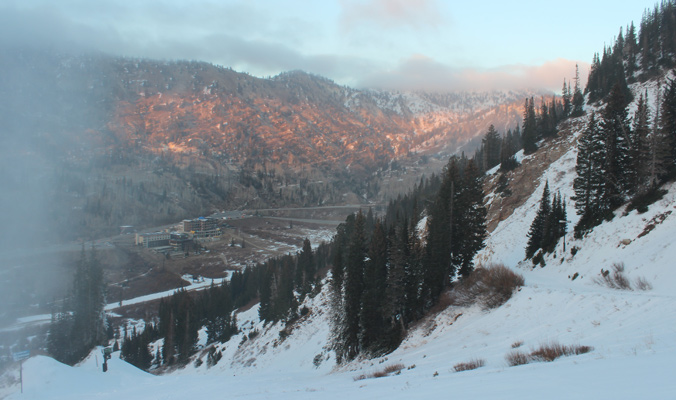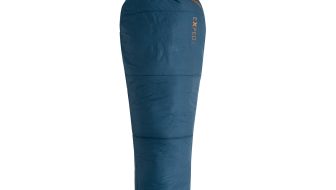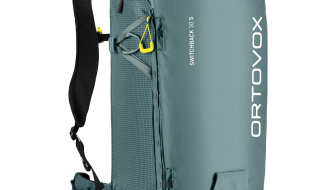
A view of Upper Little Cottonwood Canyon from the top of Alta’s Mount Baldy. [Photo] Greg Scruggs
This long-simmering conflict heated up late last month when the Central Wasatch Commission, a government body chartered to resolve land disputes and promote conservation, voted to move forward with a plan to establish a national conservation and recreation area covering 80,000 acres—excluding Alta ski resort.
Why the omission? In July, Alta Lift Company announced that it would not include Grizzly Gulch in a proposed land exchange with the U.S. Forest Service that the commission is attempting to broker. The Forest Service owns most of Big and Little Cottonwood Canyons, where the region’s four resorts—Alta, Brighton, Solitude and Snowbird—hold special use permits to operate.
Over two years, 25 people representing ski resorts, recreational users, watershed managers, conservationists, local government, and the Forest Service met monthly to craft a land use compromise called Mountain Accord, a voluntary agreement finalized in July 2015, which more than 75 local residents and stakeholders signed.
Mountain Accord lays the groundwork for an act of Congress to formalize land swaps between ski resorts and the Forest Service. The commission’s vote was a key step in the preparation of draft legislation that backers believe the Utah congressional delegation will take to Washington. The proposal heads off future ski area expansion, thereby preserving backcountry access, while transferring ownership of public land at base areas over to the ski resorts. That, in turn, will give them more control over future development of slope-side facilities like hotels and condos.
In effect, if approved, the Forest Service would relinquish the business of owning the land underneath parking lots and ski lodges. Resorts would cease to own patches of mountainside. While the concept sounds simple on paper, the details of which acres to swap came down to the wire, with final negotiations taking place right up until the day the Accord was signed.
Once settled, the Mountain Accord was perceived as a win-win by most parties, although the first attempt to translate the 16-page agreement into legislation stalled in Congress over a lack of a detailed transportation plan. However, a fresh batch of legislators is set to take office in January, including newly elected Utah Representative Ben McAdams, who helped draft the Mountain Accord. As a result, the Central Wasatch Commission, tasked with implementing the Accord and helmed by backcountry skiing local officials, believes the time is right to introduce a new version. On November 19, the Commission voted to proceed with a draft bill for the Central Wasatch National Conservation and Recreation Act that excludes Alta, which will leave the resort’s land situation with the status quo.

A Wasatch panorama from the top of Alta’s iconic Mount Baldy. [Photo] Greg Scruggs
Previous land exchange proposals discussed prior to the Mountain Accord process did not include Grizzly Gulch, according to Alta General Manager Mike Maughan. The resort’s decision to include Grizzly Gulch in the deal was predicated on three conditions detailed in the Accord: permission to build a 100-room hotel and retail complex; adequate water rights for that development; and “transit improvements (including a tunnel or other type of connection between Little Cottonwood Canyon and Big Cottonwood Canyon) that resolve transportation problems and improve avalanche control and safety in Little Cottonwood Canyon,” as stated in the document.
In May, the Utah legislature allocated $66 million for transportation improvements like public transit, park and rides, avalanche sheds and a possible tolling plan for the canyons, where powder-day traffic jams can stretch for hours along a narrow road vulnerable to dozens of avalanche paths. UDOT is currently studying the potential environmental impact of these investments, which currently do not include a tunnel between the two canyons.
“We’re helping UDOT move the transportation solutions forward now as a separate item, because we have to get both of them done. But if one of them should fail, the other needs to succeed,” Central Wasatch Commission chairman Chris McCandless explains. He estimates it will take seven years to implement a transportation plan.
For Alta, advancing the land exchange legislation separate from a transportation investment proved a deal breaker. “Alta’s position is that transportation solutions should be developed and funded in concert with legislation to create a conservation and recreation area to ensure there are not conflicts and achieve a collaborative solution,” Maughan said in a press release, noting that in lieu of the key Grizzly Gulch parcel, the resort remains willing to trade off 500 acres of surface rights and 1,300 acres of mineral rights.

Grizzly Gulch, still brown in early November, peeks through the clouds from across the valley on Alta’s snowy terrain. [Photo] Greg Scruggs
“[Alta] owns that land. It’s their right to develop it,” alliance president Chris Adams notes about the resort’s stance on land swap issues. “The question is if they decide to expand into Grizzly rather than preserve and protect it, will they work with the community on a solution that people can support and get behind or will they do it in a way that excludes the backcounty community and other user groups?”
The Alta announcement over the summer to pull Grizzly Gulch from the Accord blindsided Adams, a stalwart Alta patron whose kids grew up skiing on its slopes and whose wedding took place at the resort. “I couldn’t believe it,” he says, detailing the countless meetings and phone calls with the Accord’s different stakeholders while deciding the different possible ways to placate Alta and keep Grizzly Gulch in the deal, including allowing a chairlift in other terrain currently off-limits to the resort.
Adams finds the resort’s rationale questionable, given the differing timelines between setting aside public land in Congress and building out transportation infrastructure. “It’s a little disingenuous to say that Alta is not getting a transportation solution,” he says. “It is going to take years to come up with solutions and then years to fund and implement them.”
As those years tick along, meanwhile, Adams believes in the value of locking in the land exchanges now to create certainty about the Wasatch’s future. “While Alta may not have a plan to put a lift up there, some other group that has plenty of money could buy the resort and a lift could be there before you know it,” he worries. “If Alta is sold, I think it’s very likely that connecting the canyons will be one of the first things to happen. That, to me, becomes a scary concept.”
Last month, prior to the Central Wasatch Commission decision, Maughan said, “As we looked at the growth expected to come to Little Cottonwood Canyon over the next 50 years, our ownership said that we should probably hang onto [Grizzly Gulch] so that we can accommodate growth.” He noted that a chairlift up Grizzly Gulch could accomplish an over-the-snow connection between the two canyons in the absence of a tunnel, but adds that there are no immediate plans to install such a chairlift.
“It’s disappointing,” said Salt Lake resident Colby Stetson in the Alta parking lot as he loaded gear into his truck after a run up and down the resort. “When you make a compromise usually nobody ends up super happy. To have them renege on that whole plan is a bummer to see in a space that has such limited wilderness.”
Stetson and his touring partner agreed that Grizzly Gulch is not the kind of rowdy terrain that the Wasatch is famous for, but it nevertheless serves an important role as a safe zone for beginners to practice backcountry technique and for avalanche courses to conduct field lessons.
“It’s one of the few easy-access, high-elevation spots, which are going to become more important as things get warmer,” Stetson added.
Commission chairman McCandless is also a city councilor for Sandy, the town at the foot of the canyons. He notches more than his fair share of ski days and sees both sides of the issue. “[It’s an issue of] private property rights [versus] my ability to go up there and catch five or six runs of uncut pow on somebody else’s real estate,” he explains. “You can [ski Grizzly Gulch] based on Alta’s willingness to allow us to continue to use their property.”
In addition to providing beginner-touring terrain, Grizzly Gulch offers the safest direct access to popular destinations like Wolverine, Tuscarora and Upper Silver Fork.
“Grizzly Gulch is the keystone to some of the best skiing in the Wasatch,” Adams says, calling it the region’s busiest trailhead by a factor of two. Adams credits Maughan for insisting that the resort will work with the backcountry community to preserve some kind of uphill access should Grizzly Gulch become inbounds skiing, but there’s still a hitch. “That doesn’t mean it will be good, desirable or safe access,” Adams warns. Alta is still willing to trade 45 acres of Grizzly Gulch, but Adams notes that there are still dangerous avalanche chutes in the zone.
McCandless’ colleague, Central Wasatch Commission executive director Ralph Becker—also the former Salt Lake City mayor and a diehard backcountry skier—adopts a “de facto use” perspective and ultimately errs on the recreationalists’ side of the equation.
“The public doesn’t know where the private/public land [boundary] is, and they’ve been going up here unfettered for decades,” he notes about Grizzly Gulch’s role in the local ski community. “[Grizzly Gulch] is important to a lot of people, and that’s the reason for trying to find a solution to allow for continuing public use–and that means public ownership.”
—
To learn more about this issue, visit the Central Wasatch Commission’s website.










Those of us who live and ski in BBC want a tunnel to LCC like I want another hole in my head, a lift sure I guess but a big no to anything that allows cars through…….our traffic is bad enough.
Does the forest service require Alta to keep a reserve fund with enough cash to remove all of their structures from Albion Basin in case they go under? It sounds like this could be the scenario in the near future if they are unable to obtain the 3 items they are requesting to remain viable as a ski resort. (100-room hotel, water rights and transit improvement.)
You have got be kidding me that Alta thinks that it has 50 years of snow first off. Secondly, I cannot believe that people who ski Alta even agree with a chair over there; these so called powder hounds that sit on chairs! Third, why is the forest service even working with any ski resort?The Forest Service was founded to protect and preserve our lands an organization that we pay out of our pockets somehow to keep our lands wild but they turn it over to pussies who need to sit on a chair to get fresh tracks?!
If you really love the mountains and your community, you will never buy another season pass again. Ski resorts are very large ad destructive animal not only to the environment but the economy as well. Protect our mountains, our powder and our community by not working at a ski area or buying a season pass. Grow a pair and climb to get you fix.